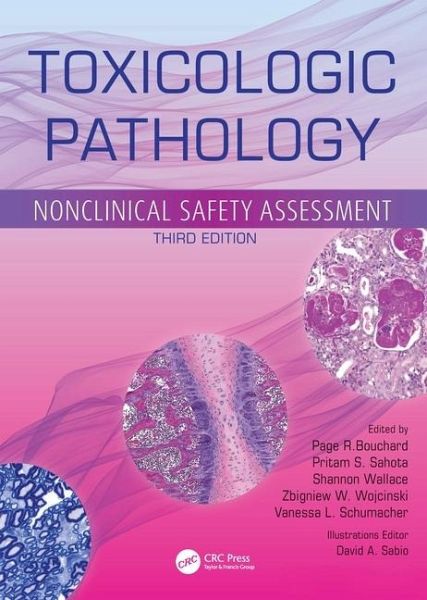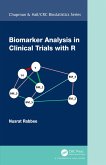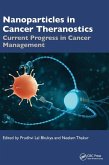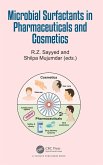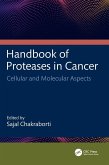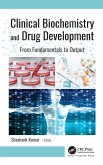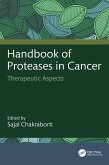Toxicologic Pathology
Nonclinical Safety Assessment
Herausgeber: Bouchard, Page R.; Wojcinski, Zbigniew W.; Schumacher, Vanessa L.; Wallace, Shannon; Sahota, Pritam S. / Illustrator: Sabio, David A.
Toxicologic Pathology
Nonclinical Safety Assessment
Herausgeber: Bouchard, Page R.; Wojcinski, Zbigniew W.; Schumacher, Vanessa L.; Wallace, Shannon; Sahota, Pritam S. / Illustrator: Sabio, David A.
- Gebundenes Buch
- Merkliste
- Auf die Merkliste
- Bewerten Bewerten
- Teilen
- Produkt teilen
- Produkterinnerung
- Produkterinnerung
Provides timely information for toxicologic pathologists working in drug development. Concept chapters consolidated into two more concise chapters. Organ system chapters have more consistent commentary and guidance on molecular mechanism of action, human translational relevance, and regulatory impact.
Andere Kunden interessierten sich auch für
![Biomarker Analysis in Clinical Trials with R Biomarker Analysis in Clinical Trials with R]() Nusrat RabbeeBiomarker Analysis in Clinical Trials with R154,99 €
Nusrat RabbeeBiomarker Analysis in Clinical Trials with R154,99 €![Nanoparticles in Cancer Theranostics Nanoparticles in Cancer Theranostics]() Nanoparticles in Cancer Theranostics198,99 €
Nanoparticles in Cancer Theranostics198,99 €![Microbial Surfactants in Pharmaceuticals and Cosmetics Microbial Surfactants in Pharmaceuticals and Cosmetics]() Microbial Surfactants in Pharmaceuticals and Cosmetics175,99 €
Microbial Surfactants in Pharmaceuticals and Cosmetics175,99 €![A Mechanical Account of Poisons in Several Essays A Mechanical Account of Poisons in Several Essays]() Richard MeadA Mechanical Account of Poisons in Several Essays18,99 €
Richard MeadA Mechanical Account of Poisons in Several Essays18,99 €![Handbook of Proteases in Cancer Handbook of Proteases in Cancer]() Handbook of Proteases in Cancer243,99 €
Handbook of Proteases in Cancer243,99 €![Clinical Biochemistry and Drug Development Clinical Biochemistry and Drug Development]() Clinical Biochemistry and Drug Development188,99 €
Clinical Biochemistry and Drug Development188,99 €![Handbook of Proteases in Cancer Handbook of Proteases in Cancer]() Handbook of Proteases in Cancer243,99 €
Handbook of Proteases in Cancer243,99 €-
-
-
Provides timely information for toxicologic pathologists working in drug development. Concept chapters consolidated into two more concise chapters. Organ system chapters have more consistent commentary and guidance on molecular mechanism of action, human translational relevance, and regulatory impact.
Hinweis: Dieser Artikel kann nur an eine deutsche Lieferadresse ausgeliefert werden.
Hinweis: Dieser Artikel kann nur an eine deutsche Lieferadresse ausgeliefert werden.
Produktdetails
- Produktdetails
- Verlag: Taylor & Francis Ltd
- 3. Auflage
- Seitenzahl: 880
- Erscheinungstermin: 24. Juni 2025
- Englisch
- Abmessung: 280mm x 210mm
- Gewicht: 453g
- ISBN-13: 9781032319193
- ISBN-10: 1032319194
- Artikelnr.: 72106354
- Herstellerkennzeichnung
- Libri GmbH
- Europaallee 1
- 36244 Bad Hersfeld
- gpsr@libri.de
- Verlag: Taylor & Francis Ltd
- 3. Auflage
- Seitenzahl: 880
- Erscheinungstermin: 24. Juni 2025
- Englisch
- Abmessung: 280mm x 210mm
- Gewicht: 453g
- ISBN-13: 9781032319193
- ISBN-10: 1032319194
- Artikelnr.: 72106354
- Herstellerkennzeichnung
- Libri GmbH
- Europaallee 1
- 36244 Bad Hersfeld
- gpsr@libri.de
Page R. Bouchard is a R&D strategy consultant to the biopharmaceutical industry with a focus on advanced therapies and emerging technologies. He retired from Novartis Pharmaceuticals in 2021 where he was the Senior Vice President and Chief Scientific Officer of the Novartis Gene Therapy Unit, and prior to that the Vice President and Global Head of Preclinical Safety. Dr. Bouchard received his DVM from Tufts Veterinary School, residency training in anatomic pathology at Cornell School of Veterinary Medicine, and ACVP board certification in 1993. Dr. Bouchard has worked as a toxicologic pathologist and project team toxicologist at Searle Pharmaceuticals, Head of Preclinical Safety at Genetics Institute, Head of Pathology and Investigative Safety at Wyeth Pharmaceuticals, Head of Preclinical Safety at Millennium Pharmaceuticals, Head of Preclinical R&D at Archemix Pharmaceuticals, and finally in his leadership roles at Novartis Pharmaceuticals. Dr. Bouchard has worked across all phases of drug discovery and development, and virtually all therapeutic modalities and disease areas. He has had the privilege of working with many companies and regulatory authorities across all regions of the world. Though the focus of his career has been managing R&D strategy and project portfolio, toxicologic pathology is the scientific lens through which he has viewed the process. Dr. Bouchard has been an active member of the ACVP and STP and has served in a variety of volunteer roles for both organizations. He is passionate about continually advancing and modernizing the science and practice of anatomic and clinical pathology and challenging pathologists to adopt new tools and fully appreciate the use, context and impact of their work. Pritam S Sahota studied for his Veterinary Medicine (BVSc) and Veterinary Pathology (MVSc and PhD) degrees at Punjab Agricultural University in India. He is a Diplomate of the American Board of Toxicology. After completing his PhD, he immigrated to the USA in 1976 and worked for Dawson Research Corporation in Orlando, Florida for 10 years with increasing responsibilities as Toxicologic Pathologist, Senior Toxicologic Pathologist, and Scientific Director. As Scientific Director, he was overall responsible for the Departments of Pathology and Toxicology in this contract research organization (CRO) that was involved in the safety evaluation of drugs and chemicals. While working briefly for Dynamac Corporation in Research Triangle Park, NC (1986-87), Dr. Sahota conducted retrospective scientific audits on 23 NTP carcinogenicity studies and participated in discussions with the representatives of NTP, FDA and EPA to summarize the results of scientific audits of approximately 200 carcinogenicity studies. In 1987, Dr. Sahota joined Ciba-Geigy Pharmaceuticals in Summit, NJ as Head/Manager of Pathologists and helped establish Pathology Peer Review, Scheduling and Quality Control systems. He continued to work primarily in this position with increasing responsibilities in Ciba-Geigy and then Novartis Pharmaceuticals (resulting from Ciba/Sandoz merger in 1997) up to 2000, when he became Head of Pathology (Director¿ Executive Director: 2000-12, East Hanover, NJ). In addition to his pathology responsibilities, Dr. Sahota also served as International Project Team Representative for a number of marketed drugs including an antihypertensive blockbuster, Diovan, where he successfully defended company position with the FDA and various International Regulatory Authorities. During 2010-12, he successfully led following Global Preclinical Safety initiatives at Novartis: Patient Centricity (Patient in the Lab), Cardiotoxicity, Ocular Toxicity, and evaluation of rodent carcinogenicity potential based on short-term toxicity and genotoxicity studies to minimize delays in regulatory submissions. Dr. Sahota also held an adjunct academic appointment of Assistant Professor in the University of Medicine and Dentistry of New Jersey, Newark, NJ for approximately 8 years. Since 2013, Dr. Sahota has been President of Global ToxPath LLC (Toxicologic Pathology Consultancy), located in Kennewick, WA, USA. (I) As Lead Editor, Dr. Sahota published following books: 1. Toxicologic Pathology: Nonclinical Safety Assessment, First Edition (CRC Press), 2013. 2. Toxicologic Pathology: Nonclinical Safety Assessment, Second Edition (CRC Press), 2018. 3. The Illustrated Dictionary of Toxicologic Pathology and Safety Science, First Edition (CRC Press), 2019. This book was considered to be the first book of its kind in Nonclinical safety Sciences. It was recognized by Book Authority Organization as one of the "100 Best Pharmaceutical Books of All Time" (Ranked #5 in 2020). 4. Current Topics in Nonclinical Drug Development, Volume-1 (CRC Press), 2021. 5. Road to Greatness, First Edition (Page Publishing), 2022. (II) As Lead Editor, Dr. Sahota is currently working on following books: 1. Toxicologic Pathology: A Primer, First Edition (CRC Press). 2. Toxicologic Pathology: An Atlas, First Edition (CRC Press). 3. Current Topics in Nonclinical Drug Development, Volume-2 (CRC Press). (III) As Co-Editor with Dr. Page Bouchard, Dr. Sahota is currently working on following book: 1. Toxicologic Pathology: Nonclinical Safety Assessment, Third Edition (CRC Press). Shannon Wallace received her DVM from the University of Florida College of Veterinary Medicine and ACVP board certification from the Armed Forces Institute of Pathology. She is also a certified Diplomate of the American Board of Toxicology. Dr. Wallace served in the U.S. Army Veterinary Corps for 20 years as both a clinical veterinarian serving military owned working dogs and marine mammals and as a boarded veterinary pathologist. As an Army veterinary pathologist, she supported research dedicated to bacterial threats, vector-borne disease, blast-induced neurotrauma, combat casualty care, and toxicologic threats to the servicemember. While in the Army, she served as a Toxicology Program Manager and planned, organized, and coordinated applied toxicologic research and toxicity testing efforts accomplished by scientists and technicians in the Program while serving as the pathologist for all studies in the Program. Dr. Wallace is currently a Senior Pathologist at Experimental Pathology Laboratories, Inc, Chantilly, VA, serving as principal investigator in a wide range of animal species and organ systems used in discovery, investigative studies and pre-clinical safety assessments. Over the past two years, current world health challenges have provided a broadening opportunity in viral research with Dr. Wallace serving as principal investigator on over 100 viral therapeutic, toxicity and efficacy studies. Dr. Wallace is a full member of numerous professional societies including the American College of Veterinary Pathologists, Society of Toxicologic Pathologists, American College of Toxicology, and the American Veterinary Medical Association. Most recently, Dr. Wallace has co-authored "New Approaches in Development of Medical Devices. In: Current Topics in Nonclinical Drug Development (2021)", "Non-mammalian Laboratory Species: Fish, Frogs and Beyond. In: Toxicologic Pathology for Non-Pathologists (2019)". She has also served as a chapter co-author in the upcoming 7th edition of Hayes' Principles and Methods of Toxicology. Zbigniew W. Wojcinski is President of Toxicology & Pathology Consulting, LLC, in Hillsborough, NC and has over 35 years' experience in drug development. Dr. Wojcinski received his undergraduate degree (B.Sc.) in Zoology from the University of Toronto and his D.V.M. and D.V.Sc. (Pathology) degrees from the Ontario Veterinary College, University of Guelph, Ontario, Canada. He is a certified Diplomate of the American Board of Toxicology (DABT) and a Diplomate of the American College of Veterinary Pathologists (DACVP). He is also recognized as a Specialist in Veterinary Pathology by the Canadian Veterinary Medical Association and is a Fellow of the International Academy of Toxicologic Pathology (FIATP). Dr. Wojcinski gained experience in drug development and toxicologic pathology during his 22-year tenure with Parke-Davis\Warner-Lambert and Pfizer Global Research and Development and then 3¿ years with Fulcrum Pharma Developments, Inc. In 2011, he founded Drug Development Pathology Services, LLC in Ann Arbor, MI and subsequently grew the organization into Drug Development Preclinical Services, LLC to provide toxicology, pathology, and drug metabolism and pharmacokinetic services to clients world-wide. Dr. Wojcinski has extensive experience as a Study Director, Study Pathologist, and Review Pathologist for numerous acute and repeated dose toxicity studies, including carcinogenicity studies. Throughout his career, he has managed successful cross-functional drug development teams and has had managerial responsibilities for DVM, PhD, and technical level staff, providing guidance for their career growth. As Therapeutic Area Leader for Dermatology at Pfizer, Dr. Wojcinski was responsible for development and implementation of the safety and risk management strategies for, what was then, a new therapeutic area. He has also been directly involved in the preparation of pre-IND documents, Nonclinical Safety Assessments for IND/IMPD/NDA/MAA, Investigator's Brochures, and labeling (USPI, SmPC) negotiations. Dr. Wojcinski has had numerous interactions with regulatory agencies in the United States, Europe, Canada, and Australia for compounds at various stages of development. He has also provided pathology consultation and histopathology peer review on several projects in various therapeutic areas, including respiratory diseases, dermatitis, cancer, and viral infections and has participated in Pathology Working Groups. Dr. Wojcinski is a full member of numerous professional societies and has served as President of the Dermal Toxicity Specialty Section of the Society of Toxicology, an Associate Editor for the Society of Toxicologic Pathology, and President (2 terms) of the American Veterinary Medical History Society. Dr. Wojcinski has lectured at the Ontario Veterinary College and the University of Maryland and authored/co-authored numerous scientific reports, manuscripts, and book chapters. Most recently, he was Co-Editor for "The Illustrated Dictionary of Toxicologic Pathology & Safety Science" (First Edition, 2019), "Current Topics in Nonclinical Drug Development - Volume 1" (First Edition, 2021), "Guideposts for Veterinary Professionals" (First Edition, 2021), "Toxicologic Pathology: A Primer" (due to be published in 2023), "Current Topics in Nonclinical Drug Development - Volume 2" (due to be published in 2023), and "Toxicologic Pathology: An Atlas" (due to be published in 2023). Vanessa L. Schumacher leads Investigative Safety, Immunosafety and Pathology in Pharmaceutical Sciences, Pharma Research and Early Development at Roche. Dr. Schumacher received dual BS degrees in Animal Science and Pathobiology and Veterinary Science from the University of Connecticut, a DVM from Cornell University College of Veterinary Medicine, and veterinary anatomic pathology residency training and MS in Pathobiology and Veterinary Science from the University of Connecticut. She received American College of Veterinary Pathologists board certification in 2010 and American Board of Toxicology board certification in 2015, and she is a full fellow of the International Academy of Toxicologic Pathology. Dr. Schumacher has previously worked as project pathologist and toxicologic project leader, as Group Head Tissue Biomarker and Digital Pathology in Early Biomarker Development Oncology, and Head of Digital Pathology, Pharmaceutical Sciences at Roche. Prior to this, she worked as Instructor and then Assistant Professor at the Institute of Animal Pathology at the University of Bern where she led the Zoo Animal Pathology program. Dr. Schumacher is a full member of the American College of Veterinary Pathologists, Society of Toxicologic Pathologists, Society of Toxicology, Digital Pathology Association, European Society of Veterinary Pathology and the European Society of Toxicologic Pathology. She is especially passionate about pathology transformation through digitalization, modernization of the pathologist role and education of early career pathologists. David Sabio works at Experimental Pathology Laboratories, Morrisville, NC, and is a North Carolina artist and graphic designer with a specialty in medical and biological illustration. With a degree in zoology from North Carolina State University and then pursuing digital art and animation at the School of Communication Arts, he has been cultivating this focus for more than 20 years, combining his interest in biological sciences and passion for art into the career he specializes in today. David Sabio is Digital Pathology Illustrator at Experimental Pathology Laboratories, Inc. (EPL) producing illustrations and animations in support of NIEHS as well as CROs, including GlaxoSmithKline, Pfizer, and Amgen, among others. David has also designed illustrations and cover art for scientific textbooks and journals. His work has been published numerous times in the Journal of Toxicologic Pathology. Collaborating with other content media productions, David has provided graphics for companies such as Oriel Therapeutics, BioCryst, King Pharmaceuticals, Aspire Pharmaceuticals, Brother and Cotton. David has worked on the Susan G. Komen Foundation's Anatomy of Breast Cancer educational program since its launch in 2003, providing the art and animations for this ongoing successful course.
1. Nonclinical Safety Assessment: An Overview of Drug and Medical Device
Development. 2. Toxicologic Anatomic Pathology and the Pathologist.3.
Toxicologic Clinical Pathology. 4. Gastrointestinal System. 5.
Hepatobiliary System and Exocrine Pancreas. 6. Respiratory System. 7.
Urinary System. 8. Hematopoietic System. 9. Lymphoid System. 10.
Musculoskeletal System and Teeth. 11. Cardiovascular System. 12. Endocrine
System. 13. Reproductive System and Mammary Gland. 14. Integumentary
System. 15. Nervous System. 16. Special Senses: Eye and Ear.
Development. 2. Toxicologic Anatomic Pathology and the Pathologist.3.
Toxicologic Clinical Pathology. 4. Gastrointestinal System. 5.
Hepatobiliary System and Exocrine Pancreas. 6. Respiratory System. 7.
Urinary System. 8. Hematopoietic System. 9. Lymphoid System. 10.
Musculoskeletal System and Teeth. 11. Cardiovascular System. 12. Endocrine
System. 13. Reproductive System and Mammary Gland. 14. Integumentary
System. 15. Nervous System. 16. Special Senses: Eye and Ear.
1. Nonclinical Safety Assessment: An Overview of Drug and Medical Device
Development. 2. Toxicologic Anatomic Pathology and the Pathologist.3.
Toxicologic Clinical Pathology. 4. Gastrointestinal System. 5.
Hepatobiliary System and Exocrine Pancreas. 6. Respiratory System. 7.
Urinary System. 8. Hematopoietic System. 9. Lymphoid System. 10.
Musculoskeletal System and Teeth. 11. Cardiovascular System. 12. Endocrine
System. 13. Reproductive System and Mammary Gland. 14. Integumentary
System. 15. Nervous System. 16. Special Senses: Eye and Ear.
Development. 2. Toxicologic Anatomic Pathology and the Pathologist.3.
Toxicologic Clinical Pathology. 4. Gastrointestinal System. 5.
Hepatobiliary System and Exocrine Pancreas. 6. Respiratory System. 7.
Urinary System. 8. Hematopoietic System. 9. Lymphoid System. 10.
Musculoskeletal System and Teeth. 11. Cardiovascular System. 12. Endocrine
System. 13. Reproductive System and Mammary Gland. 14. Integumentary
System. 15. Nervous System. 16. Special Senses: Eye and Ear.

